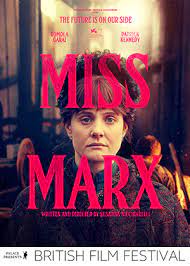
MISS MARX
Italy, 2020, 107 minutes, Colour.
Romola Garai, Patrick Kennedy, John Gordon Sinclair, Felicity Montagu, Karina Fernandez, Emma Cunniffe, Philip Groening.
Directed by Susanna Nicchiarelli.
Who is Miss Marx? She is Eleanor, the youngest daughter of the writer of Das Kapital, Karl Marx. The question occurs: do we know very much about Karl Marx himself, his background in Germany, his moving to England, his marriage, family, his writings? (There is an interesting film with August Diehl, The Young Karl Marx, 2017, directed by the Haitian Raoul Peck, this film career focused on social justice issues.) And we know less about Eleanor.
Here is an opportunity to learn something of the Marx family. And, we are offered a portrait of Eleanor, as daughter of the celebrity thinker, in her own right, her beliefs, social work and commitments.
The film has been written and directed by the Italian director, Susanna Nicchiarelli (who has gone on to make Chiara, the story of St Clare and the influence of Francis of Assisi). She has assembled an international cast, principally British, with Romola Garai in the central role, a strong screen presence, commanding when she appears, a significant woman socialist campaigning in late 19th century Britain.
In fact, the film opens with the funeral of Karl Marx, Eleanor speaking of her father and his memory. There are a number of flashbacks throughout the film, some genial memories of Marx himself, but the opening up of some secrets. The screenplay fills in a lot of family background, Eleanor’s sisters, deaths in the family, nieces and nephews.
At the time of the funeral, 1883, Eleanor met the playwright Edward Aveling and fell in love with him. Previously married with his wife refusing to divorce him, Eleanor decided to it herself for them to live as husband and wife. Romola Garai’s performance conveys the intense love she had for Edward – whereas, the audience watching him throughout the years, comes to dislike him intensely. He is self-centred, exploiting his wife, she, despite loving him, declares that he has no moral sense. He is the charming, self-preoccupied, cad, played by Patrick Kennedy.
So, while the film, in six chapters highlighting special times from 1883 to 1898 in Eleanor’s life, provides a portrait of Elenor and her personality, strength of mind, strength of will, perpetually forgiving, it also offers an opportunity to see the influence of Karl Marx’s thinking, theoretical socialism and idealistic hopes for society, but also the practical applications, Eleanor visiting working sites, meeting strikers, protesting injustice, visiting the US and continuing campaigns there, support for the suffragettes and the women’s movement.
There is a vigorous singing of the Internationale during the film – during the final credits.
For audiences who have not knowing anything about Eleanor Marx’s life, best not to do any research before seeing the film to let his have its ultimate dramatic impact. But, after watching the film, she is well worth researching to discover a strong-minded and strong-willed 19th century British woman.
- Audience knowledge about Eleanor Marx, her life, relationship with her father, his ideas and ideals, her social work and protest?
- Britain, 1883 to 1998, London, homes and flats, the countryside, protests, workers and strikes, the visit to the US, social conditions in the US? The musical score?
- Audience familiarity with Karl Marx, Das Kapital, his ideas, his background in Germany, moving to England, his wife, Helen, relationships, children? The film opening with his burial, Eleanor is tribute to him? Friedrich Engels, the other friends, relatives?
- The portrait of Eleanor, Romola Garai and her interpretation, age at the time of her father’s death, her having given her life so far to him and his ideals, protests and social concern? The encounter with Edward, falling in love, his not being divorced, the decision to live with him as husband and wife, no children? His accompanying her everywhere?
- Audience interest in and sympathy for Edward? Growing antipathy? His personality, his plays, stagings, success? Past marriage, no divorce? The relationship with Eleanor, love, accompanying her to the US, the continued flowers, the revelation of his non-awareness of money and its value? His presence over the years, friends and relatives wary of him? His absences, to write, to go to the coast? The revelation about the young woman that he married, confidence man? The strains in the relationship with Eleanor, her knowledge of his behaviour, his not contacting her, saying he did not want to worry her? His increasing ill-health? Friends advising her against him? The portrait of a callow man and Eleanor saying he had no moral sense?
- The various years, the chapter headings for the film? Eleanor as a person, personal growth, awareness? The causes, going to the factory, meeting the workers? The suffragettes?
- The family, relationships, the death of her sister, the nephew, his staying with Eleanor and Edward, liking being with them? His father? The older sister, her appearance, practical, her concern about Eleanor? The other relations, suspicions in the family? The friendship with Engels? Confronting him about not telling the truth about her father and Helen? The friendship with Helen?
- The friendship with Olive Schreiner, Havelock Ellis, their reputations in British history, South Africa? The episode with the drugs?
- The passing of the 15 years, the effect on Eleanor? Disappointment with Edward? Visiting the pharmacy, the pills?
- The musical score throughout, the classical music, champagne, the variations? The contemporary 21st-century music, as background, mood, a modern perspective on 19th century characters and action? The final frantic dance, Eleanor and the gyrations, a symbol of what was happening interiorly? Her suicide?
- The final information? Portrait of Eleanor and a tribute to her?